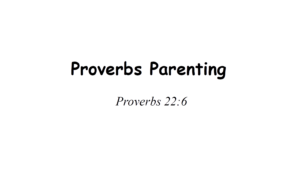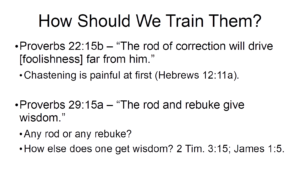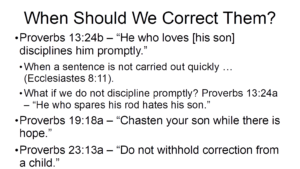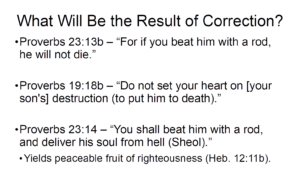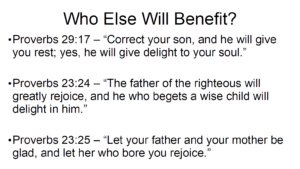Proverbs Parenting
Proverbs 22:6
Proverbs is a book of truisms, not absolutes, written by a very wise man, Solomon.
I’ve only been a parent for almost 3 years.
But Solomon is the wisest man ever to have lived.
While I have experience with my own kids, I also have had to look after my niece and nephews, several teens in a teen Bible class, and 20-30 kids at a time in school of all ages.
At the same time, I have spoken to many parents and grandparents about some of the best ways to parent.
Since this is a book of truisms, it must be noted that it is conceivable that the parents do everything right, yet the child still goes astray.
Your job as the parent is to make heaven an easier choice for your child.
When a child is conceived, you have taken responsibility for someone’s soul.
You and your mate are responsible for bringing a life into the world.
You are also largely responsible for where his/her soul goes.
There is certainly personal responsibility on the child, but you as the parents play a big role in guiding that child in the right direction.
Stats on faithfulness of children:
Both parents faithful: 72%.
Only father faithful: 55%.
Only mother faithful: 15%.
No parents faithful: 6%.
Have you created one more soul for heaven or hell?
You may not feel this applies to you if you are not currently raising a child, but …

If you do not have children, you may one day—before I was married, I would hear sermons on marriage and take note because one day I might get married.
If your children are grown, you may have grandchildren—still help and guide your grown children, but also deal with your grandchildren when you’re watching them.
If you have no intention of having children, be mindful of those who do—you might teach or babysit, but also don’t harshly judge those who discipline their kids.
We will examine several questions that Proverbs answers this morning.
Body.
Why Should We Train Up a Child?

Foolishness is bound up in the heart of a child (Prov. 22:15a).
We know this intuitively—how often does a child do something foolish?
Examples: picking up and eating things off the ground, walking in the road, playing with the power socket.
They are silly and adorable, but they don’t know right from wrong yet, they don’t know what’s safe and what isn’t.
A child left to himself brings shame to his mother (Prov. 29:15b).
Children are going to pitch a fit at some point, no matter how good the parent is.
Perhaps you have seen a child pitch when he/she doesn’t get his/her way—perhaps you’ve been that parent.
What happens when the child eventually does get his/her way?
That child has just been taught that pitching a fit is how he gets his way—so then it will happen much more often and much louder.
We are teaching Caroline now if she wants something, we say, “How do you ask?”
I want her to say that even if the answer is no, because being polite should not depend on whether or not you get your way.
In church, we’ve agreed that if our kids have to be taken out of the service into the cry room, they will not play around in there.
Things these, and being consistent with them, will help shape our children so that they will not bring us shame.
When he is old, he will not depart his training (Prov. 22:6b).
As we are training up our children, they will falter, without a doubt.
But as they get older, their training will kick in.
While it may not be true 100% of the time, it’s definitely true most of the time.
Let’s make living as a Christian easier for our kids.
The rod of correction will drive foolishness far from him (Prov. 22:15b).
“Beat the fool out of him” – spanking is endorsed here!
We must not take it too far into the realm of abuse.
We do not need to spank for every infraction.
But pain does have a way of keeping a child in line.
An alternative that works wonders with Caroline—counting. Still don’t know why that works, there’s not even a consequence attached to it though it’s implied.
But she knows if she does not comply by a certain point, she won’t like the outcome.
The trick is finding what works with your child and using it.
That’s the nature of training, as a grape vine is trained to go in the right direction.
Discipline is not supposed to be pleasant (Heb. 12:11a).
“This hurts me more than it will hurt you.” – the right attitude!
If it hurts me too, I won’t overdo it.
The rod and rebuke give wisdom (Prov. 29:15a).
Any rod and rebuke? No, could cause more harm than good.
It’s not just the rod alone, but wisdom comes by rebuke as well.
The reason for using the rod must be given for it to have the proper effect.
Make sure they understand what they’ve done wrong to associate the deed with the consequence.
But if you spank for just anything or are too harsh with your words, then you run the risk of violating Col. 3:21.
Fathers, do not provoke your children, lest they become discouraged.
There’s the possibility that you could discourage your child.
If they never please you, they’ll end up not trying anymore.
It is a natural desire for children to please their parents, so praise them when they do good.
You must find that balance with your children, to be firm but gentle, to use the rod only when necessary.
How else does one get wisdom?
Paul speaks to Timothy about the faith of his mother and grandmother (2 Tim. 1:5) and how he was taught from childhood the Scriptures which could make him wise for salvation (2 Tim. 3:15).
These women taught him these Scriptures, no doubt using the rod and rebuke to make him wise for salvation.
Wisdom also comes by prayer (James 1:5)—parents, pray that you will have the wisdom to raise your children, but also pray that your children be wise as well.
If any of you lacks wisdom, let him ask of God, who gives to all liberally and without reproach, and it will be given to him.
He who loves his son disciplines him promptly (Prov. 13:24b).
Sometimes it is not feasible to properly discipline your child at the moment they do something wrong.
But here we read that we shouldn’t delay it for too long.
“Just wait until we get home!” We say, “When we get home, I’m going to have to punish you.” And when we get home, “Remember, it’s time for your punishment.”
Solomon also wrote what happens when one is not discipline promptly (Eccl. 8:11).
Because the sentence against an evil work is not executed speedily, therefore the heart of the sons of men is fully set in them to do evil.
So what happens if we do not discipline them promptly? They think they’re actions are acceptable and will keep going. “Oh, nothing is going to happen? Great, I’ll keep going then.” The connection to deed and consequence is not made.
He who spares his rod hates his son (Prov. 13:24a).
At the same time, if we do not discipline our children, do we really love them?
I’m sure we all do, but we must show it by doing what’s best for them.
Chasten your son while there is hope (Prov. 19:18a).

I knew a man who became a Christian later in life, and there was a lesson like this. He asked the teacher, “My grown kids are not faithful; what can I do now?”
The answer is: “Far less than you could have done when they were younger.”
The younger they are, the easier a course correction can be made.
That doesn’t mean there is no hope when they are older, but it does mean there isn’t as much.
It’s like a ship that’s gone off course …
Do not withhold correction from a child (Prov. 23:13a).
There should not be a time when they aren’t corrected in some way for doing something wrong.
You set a boundary, you must not let them cross it without consequence.
What Will Be the Result of Correction?

If you beat him with a rod, he will not die (Prov. 23:13b).
Here is a negative—indeed, he will not die!
It’s true, when a child is punished they may holler and scream, and you might use this verse to assure you and you’re not killing your child.
But really, this verse is informing you that such correction can save a child’s life, yes, even his very soul!
The penalty for certain sins in the OT was death—correcting your child could prevent them from this sentence (e.g. Lev. 24:10-16).
But we certainly know for today that such correction could prevent our children from the second death, that is from hell.
And it might just prevent them from doing something that could kill them: drunk driving, hooked on drugs.
Do not set your heart on your son’s destruction (Prov. 19:18b).
Literally this says, “Do not set your heart to put him to death” – a reference to the death penalty for certain sins.
This is what happens when we fail to chasten our children while there is hope.
If we wait too long, destruction awaits.
You shall beat him with a rod, and deliver his soul from hell (Prov. 23:14; Heb. 12:11b).
Hell is translated from the word “Sheol,” that is the grave or Hades in the NT.
In other words, such discipline can prevent your child from death.
Of course, we must take care of his physical needs, but we also have the responsibility of taking care of his spiritual needs!
That doesn’t mean we are to spank them harshly and frequently without cause—it means, in light of the other verses, that we should not shy away from it when needed.
Obviously the child benefits—but you will benefit, too.
He will give delight to your soul (Prov. 29:17).
Father of righteous will greatly rejoice (Prov. 23:24).
Their parents will rejoice (Prov. 23:25).
Life is easier if your kids are well-disciplined.
Isn’t in exhausting to tell your kids to do something 100 times and they still don’t listen?
In fact, kids secretly love discipline and structure—they thrive in it.
But you do have to fight them to get to that point: “If the kid wins, they lose.”
Our older child is about to turn 3, and I once heard someone say, “Anyone who has used the term ‘terrible twos’ has never had a 3-year-old.”
Whatever the case, I look forward to the challenge, and pray that the foundation we’ve set thus far will guide her as she gets older, and that we can do the same for our son.
The hard work we’ve put into raising our children will pay off and is paying off—that’s what it means to beget a wise child.
I’m not saying we’re perfect parents, and some kids are easier than others.
But they get that delightful wisdom from the rod and rebuke, from God’s Word, from prayer.
We will delight in them, be glad, and rejoice.
Parenting is not easy, but God gave us some guidelines.
People often say that children don’t come with a manual.
Well, first, there are plenty of books on parenting.
But there’s only one infallible book that talks about it, the Bible.
Let us follow these proverbs, and our homes will be in much better shape.
You cannot guide your children to heaven if you are not on your way there, too.
